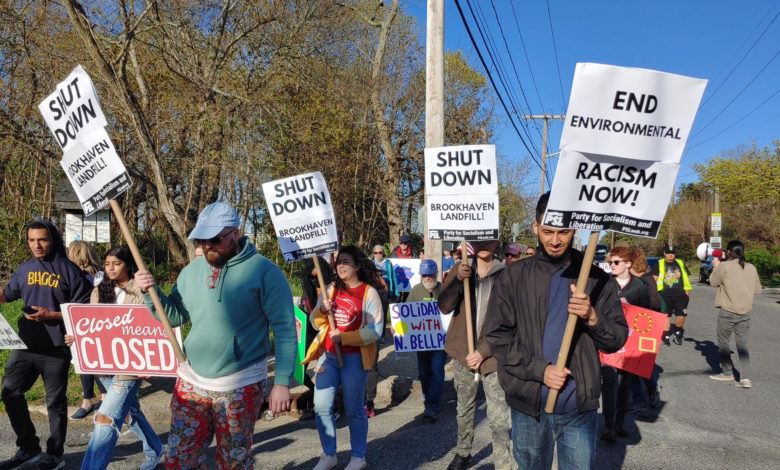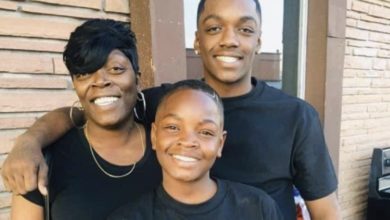
On April 30, around 75 community members in North Bellport, N.Y., on Long Island held a rally and vigil at Frank P. Long Intermediate School to demand the closure of the nearby Brookhaven Landfill. The action was organized by the Brookhaven Landfill Action and Remediation Group and attended by the Party for Socialism and Liberation.
The Brookhaven Landfill is slated to be closed in 2024, but the town of Brookhaven has offered no plan to deal with the “garbage crisis” facing Long Island after the landfill’s closure. Nor has the town acknowledged the overtly racist placement of the landfill to begin with.
History of environmental racism
The Brookhaven Landfill was opened in 1974, directly north of North Bellport. North Bellport itself already had a history of blockbusting in the 1960s before the landfill opened: real estate agents used racist scare tactics to convince white residents to sell their property below market value, and then resold those properties at a marked-up price to Black and Latino families seeking upward mobility.
Like almost 80% of other landfills and garbage incinerators in the United States, the Brookhaven Landfill was placed near a low-income community of color. And that community has dealt with the environmental consequences of the landfill ever since.
The Environmental Protection Agency has reported that North Bellport consistently ranks in the 80th to 95th percentile for the following indicators: fine particulate matter, ozone, airborne diesel particulates, cancer risk from air toxics, respiratory hazards, wastewater discharge, as well as other environmental hazards.
Frank P. Long Intermediate School — attended by over 500 4th- and 5th-grade students, and consisting of over 60 staff members — is located a half-mile away from the Brookhaven Landfill. Students and staff have consistently complained about the smell, and 35 previous employees of the school have developed cancer since 1998.
Community members demand reparations and environmental justice
BLARG activist and founding member Monique Fitzgerald spoke with Liberation News about how community members formed BLARG to raise awareness around the issue of environmental racism.
“We got together in the Spring of 2020 after George Floyd was murdered,” Fitzgerald explained. “Many of us got activated to protect Black lives, and in so doing, also felt there was an urgent need for us to protect the lives of the Black, Indigenous and Latinx folks here where we are locally. Some of the things that have been plaguing our neighborhoods for decades has been this landfill, so we directed a lot of our energy into figuring out how we can close the landfill down once and for all.”
Another founding member of BLARG, Abena Asare, spoke about BLARG’s vision for environmental justice.
“When you look at other islands across the world, they are usually at the forefront of waste issues,” said Asare. “But because of all sorts of aspects of Long Island’s history — the racism, the classism — they [local officials] have been able to stick their heads in the sand by making some areas sacrifice zones. So, there needs to be a real investment in creating a different waste infrastructure which has to be committed to zero-waste planning.”
Asare made clear that the only viable solutions going forward necessitated involvement from members of the community.
“In terms of trying to make amends here: that is a question for the community,” she explained. “When you look at the fact that North Bellport specifically has the lowest life-expectancy [on Long Island] and has suffered physically and economically from the proximity of the landfill, if you even look at the home prices in North Bellport as opposed to other areas, you see a huge difference. There needs to be directed investment built on uplifting and making this community whole. But exactly how that is done will have to be with the conversation and the direction of the people who are most impacted.”
Fitzgerald also echoed the need for accountability on the part of the city.
“We have to put pressure on our local government to ensure that this landfill gets closed,” she emphasized. “Not only closed, but cleaned up. Not only cleaned up, but acknowledge the wrong and harms done to this community and remediate that issue in the form of reparations and accountability.”
‘Dump the dump! Enough is enough!’
The action began with a rally and vigil at Frank P. Long Intermediate School. Fitzgerald opened the rally by reminding attendees that the land they were standing on was stolen from the Unkechaug tribe, acknowledging the ongoing importance of Indigenous struggles on Long Island.
Following Fitzgerald, another BLARG organizer, Hannah Thomas, uplifted the stories of the staff members who developed cancer during their employment. Of the 35 Frank P. Long Intermediate School staff members, 14 have passed away due to cancer-related health complications. These numbers do not reflect the ongoing exposure to students and staff. A moment of silence was held for the staff members who had died, and for those who were put at future risk due to their exposure.
After the vigil, attendees then marched through the streets of North Bellport from the school to Robert Rowley Park. Along the way, protesters chanted, “Dump the dump! Enough is enough! All I got to say is they don’t care about us!”
When the march arrived at the park, a tabling hour was held, and food was provided to action attendees and North Bellport residents. Despite the very serious occasion of the day of action, a chord of joy and community was struck as the people came together for a shared struggle.
Capitalist waste and environmental racism
Organizers acknowledged that there was plenty of work to be done to assure the Brookhaven Landfill closes by 2024, and that reparations be delivered to North Bellport in the wake of the environmental damages posed by the landfill. But the community was determined to keep the fight going.
As BLARG members explained to Liberation News, they located this fight against the landfill within the global struggles against environmental racism and capitalist waste-mismanagement.
“The landfill in Brookhaven must close,” Fitzgerald asserted. “We don’t want to shift our problems to the next landfill miles and miles away. We are in solidarity to all communities like ours who are suffering near a landfill or some type of waste infrastructure.”






